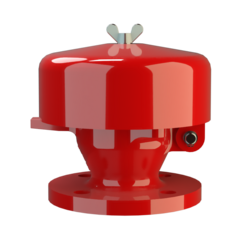Function and Description
The PROTEGO® E/H0 vent cap allows vessels which are not pressurized to vent. This device prevents rain and dirt from entering the vent line. The EH/0 vent cap is not flame transmission proof. It is often used in combination with detonation flame arresters, when those are used in vent lines, installed at a position which creates a long run up distance from the end of the vent line to prevent endurance burning. The PROTEGO® EH/0 vent cap will then be installed at the end of that vent line to prevent particles or rain from entering the line.
The vent cap PROTEGO® EH/0 main components are a housing (1), a weather hood (2) and a protection screen (3). The device is equipped with a fixed weather hood out of metal. The protection screen prevents particles or rain from entering the
Dimensions
To select the nominal size (DN), please use the flow capacity charts on the following pages
| DN | 20 / ¾" | 25 / 1" | 32 / 1¼" | 40 / 1½" | 50 / 2" | 65 / 2½" | 80 / 3" |
| a | 163 / 6.42 | 163 / 6.42 | 163 / 6.42 | 183 / 7.20 | 183 / 7.20 | 218 / 8.58 | 218 / 8.58 |
| b | 175 / 6.89 | 175 / 6.89 | 175 / 6.89 | 190 / 7.48 | 190 / 7.48 | 200 / 7.87 | 200 / 7.87 |
Material selection
| Design | A | B |
| Housing | Steel | Stainless Steel |
| Weather hood | Steel | Stainless Steel |
Flange connection type
| EN 1092-1; Form B1 |
| ASME B16.5 CL 150 R.F. |
Design Types and Specifications
Following designs are available:
Vent cap, basic design | EH/0 |
Special designs available on request
Flow Capacity Chart

The flow capacity charts have been determined with a calibrated and TÜV certified flow capacity test rig. Volume flow V in (m³/h) and CFH refer to the standard reference conditions of air ISO 6358 (20°C, 1bar). For conversion to other densities and temperatures refer to Sec. 1: “Technical Fundamentals”.

